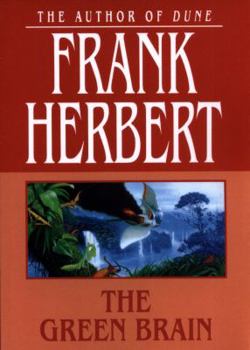The Green Brain
Select Format
Select Condition 
Book Overview
A fascinating examination of the fragile balance between consciousness, man and insect from one of the best-loved science fiction creators of all time.
Format:Paperback
Language:English
ISBN:0765378892
ISBN13:9780765378897
Release Date:September 2002
Publisher:St. Martins Press-3PL
Length:320 Pages
Weight:2.20 lbs.
Dimensions:0.5" x 5.0" x 7.0"
Customer Reviews
5 ratings
Good yarn
Published by Thriftbooks.com User , 15 years ago
While it is Dune that is Frank Herbert's greatest work, his other works should never be overlooked. I enjoyed this book rather much. Not quite as much ad Dune, but few things hold up to Dune. It was a unique and interesting tale about insects and evolution, and I would recommend it to anyone else.
A Short View of a Long Idea
Published by Thriftbooks.com User , 17 years ago
An interesting book in the light it sheds on Dune. You can read the entire Dune series a number of times and get so caught up in the political/religious/sexual etc. themes that you can miss the larger point he begins to make as the story progresses, which is that ecology, when taken to its logical conclusion and extended beyond its customary limits of flora/fauna systems, is the ultimate science, uniting hard and soft disciplines from physics to economics to religion by studying their interactions. Not a fantastic book by any stretch, but still really interesting, and essential if you want to really understand Herbert and Dune. Completely worth 7 bucks and an afternoon of your time. It will make the Dune series more meaningful. Rob Darling
It wasn't that bad.
Published by Thriftbooks.com User , 20 years ago
Dune was one of the most amazing books I have ever read. It was a feast for the mind. This book on the other hand was a light snack. Wich I think Mr. Herbert intended. I have nothing bad to say about this novel. It is an interesting story with a cool ending. The guy who did the first reveiw took it too seriously. Lighten up!
Fascinating ideas, incredible description.
Published by Thriftbooks.com User , 20 years ago
Some time in the future, people are trying to make the Earth more habitable by destroying all of the world's insects and replacing them with genetically engineered ones that are more favorable to human populations. As the insects are faced with extinction, mutations appear that are better able to combat the new threat. Things get pretty strange, but this is by no means a bad thing.Oh no! A *CHIGGER* has appeared inside of the insect-free zone! By the way, the chigger is half a meter long and spits acid. Yes, I realize that that is technically impossible. Don't worry: technicalities like that are taken care of.Anyway, it gets better. The insects have also managed to copy the human idea of INTELLIGENCE--hence the title of the book.The introduction and exploration of these ideas are done admirably during the first half of the novel. Then, around the half-way point, the whole tone and direction of the story changes. And this is when it gets REALLY good. The final chapters are composed of pages and pages of description. Sound boring, does it? Not in the least. This is the best description I have ever read in my life. The mood is perhaps described best as "Poe-esque"--subtle psychological descriptions that pull you right into the story, make you really understand how the characters feel. It takes you right along with the characters, providing real empathy, fear, love, anger and understanding all the way. Of course, it's more than JUST description. The Master brings so much into the writing in ways that only he can do. There's just no way to describe it--like everything Frank Herbert, you need to read it for yourself to know what it's like. I didn't really like the very last chapter, but I suppose nine out of ten ain't too bad.The philosophical theme of the story is basically deep ecology or something similar to it. Herbert really shows his conservationist side in this one. Also, a lot of it kind of reminds me of Nietzche.This is a very short novel (208 pages), but every page Frank Herbert writes is worth ten pages written by a lesser author. If you are a Frank Herbert fan--or a fan of intelligent fiction in general--you should definitely check out this book.
Another outstanding Herbert yarn...
Published by Thriftbooks.com User , 24 years ago
Here the concept of consciousness is grappled with. The insects are part of a greater collective mind that manifests itself and communicates with human adversaries. Very interesting interface, makes your own brain start to cook in its very juices just to think about it all. Reminds me of the Death World series by "Harry Harrison" I wonder if it's ok to plug both in this one space.






